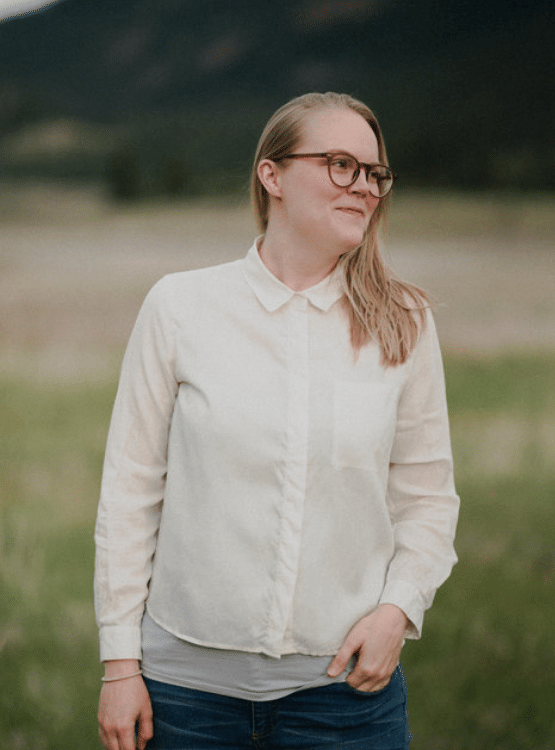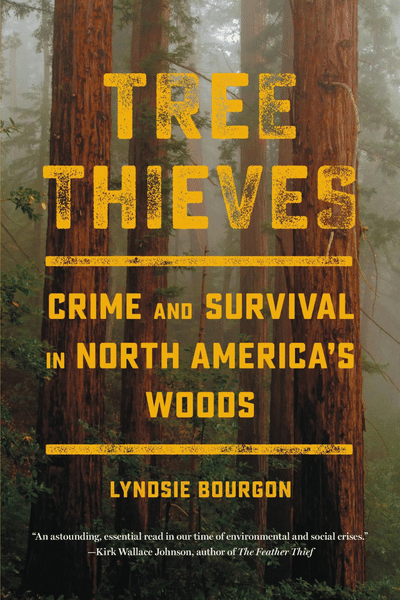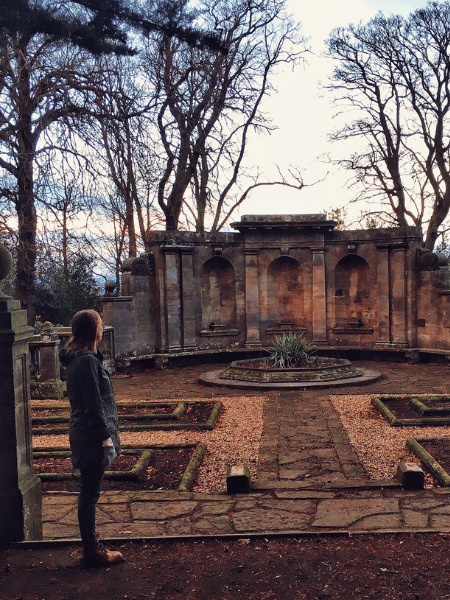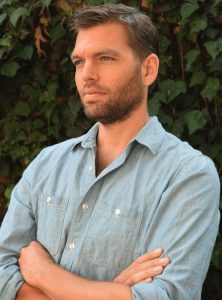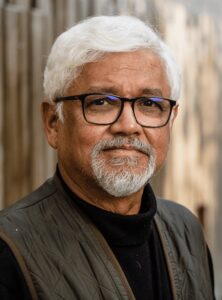 “A refreshing and compassionate warning about the perils of well-intentioned but overzealous environmentalism.”—New York Times
“A refreshing and compassionate warning about the perils of well-intentioned but overzealous environmentalism.”—New York Times
 “Tree Thieves is just an exceptional book. It’s a gripping investigation into tree poaching, a remarkably compassionate study of the culture clashes involved, a thoughtful look at environmental values. But underlying all of that is Lyndsie Bourgon’s lyrical reminder of everything we love and everything we lose in a world of vanishing forests.”—Deborah Blum, Pulitzer-prize winning author of The Poisoner’s Handbook
“Tree Thieves is just an exceptional book. It’s a gripping investigation into tree poaching, a remarkably compassionate study of the culture clashes involved, a thoughtful look at environmental values. But underlying all of that is Lyndsie Bourgon’s lyrical reminder of everything we love and everything we lose in a world of vanishing forests.”—Deborah Blum, Pulitzer-prize winning author of The Poisoner’s Handbook
 “An astounding, essential read in our time of environmental and social crises. Tree Thieves exposes the astonishing realities of tree poaching and the dire consequences of excluding rural and Indigenous communities from preservation efforts.”—Kirk Wallace Johnson, author of The Feather Thief and The Fishermen and the Dragon
“An astounding, essential read in our time of environmental and social crises. Tree Thieves exposes the astonishing realities of tree poaching and the dire consequences of excluding rural and Indigenous communities from preservation efforts.”—Kirk Wallace Johnson, author of The Feather Thief and The Fishermen and the Dragon
 “Supple, thoughtful prose that may remind you of Rebecca Solnit.”—San Francisco Chronicle
“Supple, thoughtful prose that may remind you of Rebecca Solnit.”—San Francisco Chronicle
 “Bourgon vividly captures a hidden cat and mouse game playing out in some of the world’s most iconic forests.”—Sarah Berman, author of Don’t Call It a Cult: The Shocking Story of Keith Raniere and the Women of NXIVM
“Bourgon vividly captures a hidden cat and mouse game playing out in some of the world’s most iconic forests.”—Sarah Berman, author of Don’t Call It a Cult: The Shocking Story of Keith Raniere and the Women of NXIVM
 “Absorbing. Part social history, part true crime,Tree Thieves is a riveting tale of timber heists plaguing forests from the redwoods to the Amazon.”—Ash Davidson, author of Damnation Spring
“Absorbing. Part social history, part true crime,Tree Thieves is a riveting tale of timber heists plaguing forests from the redwoods to the Amazon.”—Ash Davidson, author of Damnation Spring
 “Tree Thieves is both an absorbing true-crime story and a fascinating examination of the deep and troubled relationship between people and forests. From Sherwood Forest to the California redwoods to the Peruvian Amazon, Lyndsie Bourgon illuminates the violent conflicts over power, class, and identity that continue to shape and scar the forests we depend on.”—Michelle Nijhuis, author of Beloved Beasts: Fighting for Life in an Age of Extinction
“Tree Thieves is both an absorbing true-crime story and a fascinating examination of the deep and troubled relationship between people and forests. From Sherwood Forest to the California redwoods to the Peruvian Amazon, Lyndsie Bourgon illuminates the violent conflicts over power, class, and identity that continue to shape and scar the forests we depend on.”—Michelle Nijhuis, author of Beloved Beasts: Fighting for Life in an Age of Extinction
 “Tracking thieves, poachers, and capitalists, Lyndsie Bourgon masterfully takes on the role of detective shining a light on the complex and camouflaged world of the timber black market. The result is a meticulous investigation and a powerful testimony to the trees silently taken and the consequences of their fall that reverberate well beyond the forest.”—Harley Rustad, author of Lost in the Valley of Death
“Tracking thieves, poachers, and capitalists, Lyndsie Bourgon masterfully takes on the role of detective shining a light on the complex and camouflaged world of the timber black market. The result is a meticulous investigation and a powerful testimony to the trees silently taken and the consequences of their fall that reverberate well beyond the forest.”—Harley Rustad, author of Lost in the Valley of Death
 “Tree Thieves is a deeply researched examination of the past, present, and future of our forests, told through stories of timber poaching. Lyndsie Bourgon shows us that we must take into account all the complexities of human-nature relationships if we are to have any hope of keeping our standing giants alive.”—Gina Rae La Cerva, author of Feasting Wild
“Tree Thieves is a deeply researched examination of the past, present, and future of our forests, told through stories of timber poaching. Lyndsie Bourgon shows us that we must take into account all the complexities of human-nature relationships if we are to have any hope of keeping our standing giants alive.”—Gina Rae La Cerva, author of Feasting Wild
 “A fascinating blend of history and boots-in-the-mud journalism, which manages to dig into ancient and thorny questions about who really owns wild land and who is allowed to live off it. To poach of course means to steal. But is wilderness preservation also a form of theft, only on a larger scale? This book does what all great books should: it leaves your mind broader, deeper, and more nuanced.”—Robert Moor, author of On Trails: An Exploration
“A fascinating blend of history and boots-in-the-mud journalism, which manages to dig into ancient and thorny questions about who really owns wild land and who is allowed to live off it. To poach of course means to steal. But is wilderness preservation also a form of theft, only on a larger scale? This book does what all great books should: it leaves your mind broader, deeper, and more nuanced.”—Robert Moor, author of On Trails: An Exploration
 “An enlightening and well-balanced account of the potential effects of environmental protections on local communities.”—Kirkus Reviews
“An enlightening and well-balanced account of the potential effects of environmental protections on local communities.”—Kirkus Reviews
 “Bourgon’s thoughtful approach and sharp investigative reporting will give environmentalists, policymakers, and park lovers a new perspective on the consequences of prioritizing endangered environments at the expense of the people who live in them. Nature lovers, take note.”—Publishers Weekly
“Bourgon’s thoughtful approach and sharp investigative reporting will give environmentalists, policymakers, and park lovers a new perspective on the consequences of prioritizing endangered environments at the expense of the people who live in them. Nature lovers, take note.”—Publishers Weekly

